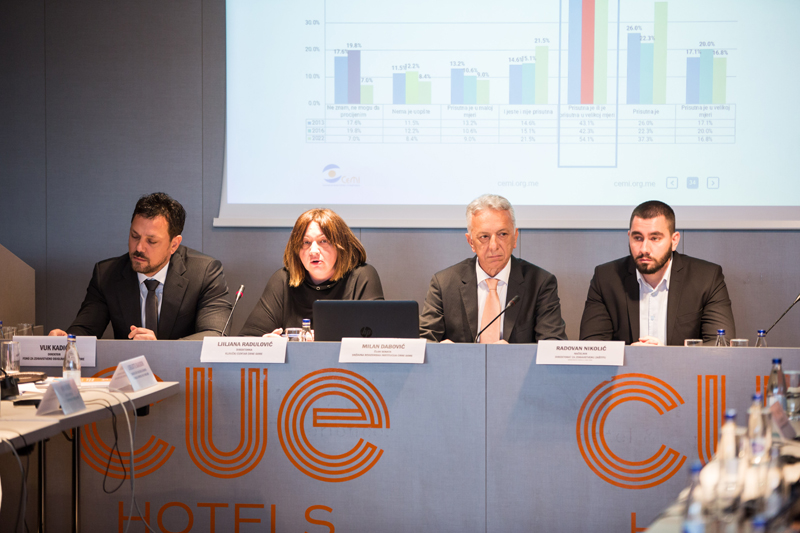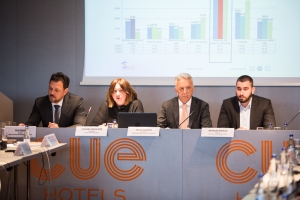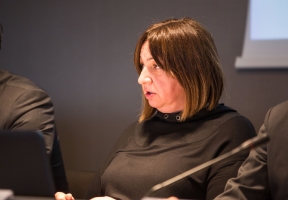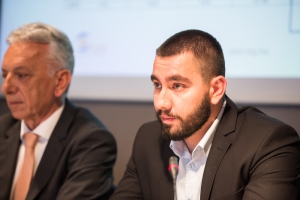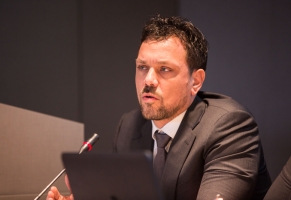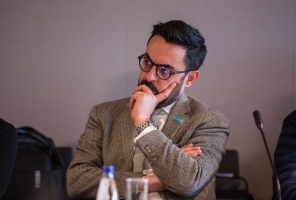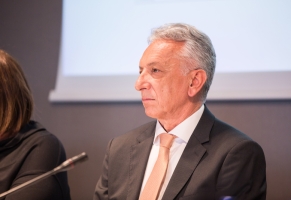A zero rate of corruption and the construction of a stable, financially sustainable health care system, in which everyone can receive quality and efficient health care, is the only way to restore the trust of citizens.
This was said at the panel "How to increase citizens' trust in the health system and fight corruption in the Montenegrin health system?", which was organized by the Center for Monitoring and Research (CeMI).
Director of the Clinical Center of Montenegro, Ljiljana Radulovic, said that based on her years of service, she must have a perception of the shortcomings of the health system.
He believes that one of the problems of the health system is a long hierarchical chain that is wrongly placed and will take a long time to correct.
Speaking about corruption in the healthcare system and the fact that citizens do not report it, Radulovic said that this is because they do not trust the institutions themselves, which are responsible for implementing adequate punishment mechanisms.
She said that it should be clearly announced in which part of health care corruption is carried out.
"In health care, we must have a zero rate of corruption and data that is true in order to analyze it properly," stressed Radulovic.
As she said, KCCG is working to make available written guidelines and good clinical practices that will demonstrate the appropriateness of medical procedures in the next five years.
Radulovic also pointed out that it is necessary to create an electronic waiting list, which they are aware is a big problem and expense.
Member of the Senate, State Audit Institution of Montenegro, Milan Dabovic, said that there are systemic problems that last for a long period of time and that can be identified with a serious audit.
"It is necessary to restore the trust of doctors and workers in the healthcare system, because if you find yourself in an unstable environment and if you feel that instability personally, you immediately begin to lose trust in that system and look for an alternative," said Dabovic.
According to him, that alternative may look like corruption, which in the long run can destroy the health system.
"By abolishing contributions, the health system has been directly brought into the red, which must be covered by revenues from the budget, be it capital, social or some other," explained Dabovic.
Dabovic presented concrete data that indicate the financial unsustainability of the existing system, especially after the abolition of allocations for health care contributions.
"What happens in the 21st year, when we already have a certain deficit of 144 million euros, the contributions for health care are abolished," said Dabovic.
Then, as he stated, the annual Budget Law for 2022 is passed and there are no longer 180 million euros, but 19 million, which are some backlogged contributions. Spending is projected at 332 million, with 313 million euros missing.
"In the end, we have the annual Budget Law for 2023, where we have a spending level of 386 million euros, and the contributions left behind from the previous period are only 1.2 million euros, so we have a deficit of 384 million euros," said Dabovic.
He also pointed out that salaries in healthcare are growing very quickly.
"In gross terms, they amounted to 104 million euros in 2019, 121 million euros in 2020, and 133 million euros in 2021. In 2022, they were projected at 138 million euros and this year 153 million," said Dabovic.
He said that in the perception of fiscal indicators, there is another "strange phenomenon".
"We had a breakthrough deficit in 2009, and then a very stable financing system until 2019 and then a sudden entry into instability." It is an inherent component and neither the Fund nor public health institutions could influence it," said Dabovic.
As the first problem of the Health Care Fund, he stated that it has a large dispersion of commercial accounts, which are linked to banks and have a state label.
"We found ten million euros on those accounts. It is likely that this money gives some discretionary right to those local health care units to use it at their discretion, beyond budget restrictions or purposes defined by law," said Dabovic.
He said that it is good that this money has been identified, because it can be used for more useful purposes.
Dabovic said that as part of the report, they also made an overview of unjustified advances by public health institutions, and on average it amounts to 40 percent.
"We have four large hospitals that did not justify advance payments at all, we have five hospitals that justified between 40 and 50 percent and eight hospitals that did not justify up to 20 percent." Here we come to the question of rationality, because if someone does not have patients, does he have the right to receive money", said Dabovic.
He said that it is necessary to strengthen internal controls in the Health Fund, and that if the problems of records, fiscal discipline are solved and if the health system is stabilized in the right way, "then we will get health care for all of us".
The director of the Health Fund, Vuk Kadic, said that it is their duty to pay the advance amount, because, as he pointed out, they give the possibility for that public health institution to function.
According to the contract, public healthcare institutions are obliged to justify these funds and to submit complete invoices by the 10th of the month, for the previous month. For several reasons, this does not happen in real time, and then we have interval reconciliations at the quarterly level, where we try to reconcile what was paid with what was invoiced," explained Kadic.
As a problem, he points out the inadequate prices of those health services, which, as he said, are too low.
"That's why if I am in this position, when the price list changes are made, public health institutions that do not invoice their services will be sanctioned," said Kadic.
According to him, the way of organization in health institutions showed a level of deficiency due to uneven utilization of what is the essence of primary and secondary health care.
"95 percent of the services of KCCG, as the only tertiary institution in Montenegro, refer to primary and secondary health care. This means that we have made a serious mistake in the organization itself, and this can be one of the reasons for the dissatisfaction of our citizens with the service provided and the inability to come for a certain type of examination", said Kadic.
According to him, the image is being created that citizens cannot get adequate health care, but in fact everything is a consequence of decentralization.
Kadic said that the healthcare budget and a new payment model based on the service provided should be planned more realistically.
"At the moment, a third of the Fund's budget goes to the salaries of employees in the health system." In Slovenia, it is only ten percent, and here we are talking about the functionality of the health system, where another third is spent on medicines," said Kadic.
He said that from the moment when public health institutions are paid according to performance, it will be possible to know who works and how much and what services are provided.
The head of the Directorate for Health Protection, Ministry of Health of Montenegro, Radovan Nikolic, pointed out that the problems in the health system are everyone's problems and that it is necessary for everyone to participate in solving them, not just an individual or an institution.
"Corruption is a global problem, which is especially dangerous if it is present in healthcare. That's why we need to connect and digitize the health system and connect the primary, secondary and tertiary levels," said Nikolic.
According to him, only when a system is created where the patient will know what his path is, we can talk about more serious suppression of corruption in healthcare.
"We have to treat the health system responsibly, but the health system must also treat patients equally responsibly," concluded Nikolic.
During the discussion, the head of the World Health Organization in Montenegro, Mina Brajovic, noted that corruption is recognized as an obstacle to achieving universal health care.
According to her, there are many systemic problems in the health system of Montenegro, which are the generator of numerous inefficiencies and irrationalities.
"It refers to the uneven distribution of resources, be it money, staff, medicines, and corruption, as another problem, can contribute to these irrationalities," said Brajovic.
He points out that the most toxic form of corruption is the one that occurs during the provision of health services and that it is not good to qualify some of its forms as petty.
Brajovic pointed out that the panel recognized a whole set of important measures and interventions and that in this sense it is necessary to make a plan to fight against corruption.
Nikola Ilic from the Spektra Association said that for many years they have been trying to get in touch with the Ministry of Health and the Health Insurance Fund, when it comes to the medicine needed by transgender women.
Radulovic said that she believes that next year, whoever will be the head of the Clinical Center, there will be no obstacles and that for such a small number of patients they will find some way to get the necessary therapy.
She explained that "small numbers" represent a big problem, because there are no interested parties for the registration of that drug.
"The medicine has just arrived and I expect that in the next two weeks it will arrive at the Clinical Center's pharmacy, and only then can we start distribution," said Radulovic.
Marija Popovic Kalezic from the Center for Civil Liberties believes that the data presented in the Publication do not encourage citizens to report corruption in healthcare.
"From the Publication itself, it can be seen that based on 384 inspections and inspections in private and public health institutions, not a single irregularity was recorded in the part of compliance with the regulations for the performance of additional work by health workers and associates," said Popovic.
That, as she said, is a "big question mark", because then the way in which the inspection was carried out is called into question.
